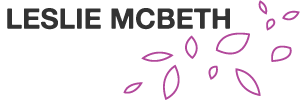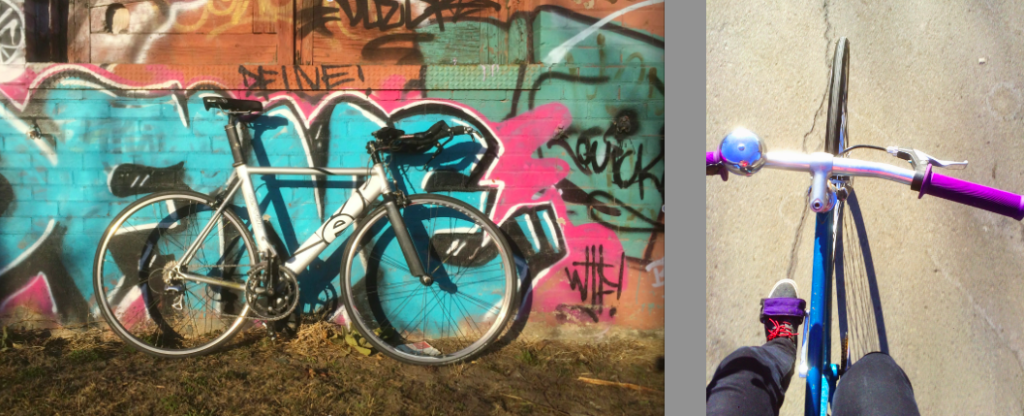Today I went for my first long bike ride of the season. I’ve been riding all winter long, so despite the fact that the thermometer was hovering around freezing, it felt downright balmy compared to the -21 that I rode through in January. My commuter bike is currently in pieces in my backyard as I await a new drivetrain (the result of riding on winter roads), so I’ve been riding my Cervelo Dual, a tri-bike.
Although both bikes have their advantages, the Cervelo is distinct in its speed. She’s fast. Whereas my commuter, an old Puch steel-frame from the 1970’s that I call Penelope, is sturdy and takes the rocky winter terrain of Toronto’s streets with ease, the Cervelo makes every bump in the road reverberate through my arms and legs. The Cervelo is light and has gears, which make hills a breeze, while Penelope has the advantage of a luggage rack to carry my clothes and gear. The Cervelo has aggressive geometry and is best experienced from the aerobars, while Penelope provides a good posture for seeing what’s ahead. Both bikes perform the same function, but they do so differently.
If I were to compare my experience with Cohort 21 and the action plan process, it’d be the best of both bikes.
The Cohort itself is small enough to be nimble, yet it has a sturdy frame that provides the important structure to navigate from. As facilitators, we were able to make changes to the program based on both the needs of the members and our own experience and interests, building on a framework that has been tried and tested over the past several years.
With the help of a network of peers, I felt like climbing over challenging points in the year was easy – like having gears. When I got stuck, I’d tune into Twitter and see what others were talking about. I’d read a blog post by @ddoucet and be inspired by the changes he was making in his school, or see a post from @egelleny and see that be inspired on how she tackling bringing Twitter to teachers at her school. Sometimes I’d get stuck in first gear and not have the energy to post or even think about my action plan. But, the blogs of other members were like a luggage rack that was piled high with ideas for me to carry with me both in my action plan, and in my day-to-day classroom practice.
So, today as I was biking and thinking about my final action plan post, looking back and looking forward, I realized that what Cohort 21 has really done for me is to coalesce all of my experience, interests and education to-date in a meaningful way that has refined my teaching practice and my solidified my confidence in my expertise in two areas.
I started off the new year with the goal of using online tools to build a PLN within my school. But, after looking back on the Design Thinking workshop and meeting with Edwin, my Vice Principal of Teacher and Staff Development, I realized that perhaps the most valuable aspect of Cohort 21 that I should bring back to Greenwood is Design Thinking
Running the Design Thinking workshop also led me to tweak the way that I was presenting Design Thinking in my classroom. I realized that I could be using this framework even more to help students solve problems, and in particular in the Grade 11 Green Industries class, I needed to let the students empathize with their users and define their own problems, rather than having me provide this information for them as I had in previous years. These small changes have led to big improvements in student’s projects this year.
I was recently invited to give a TEDx Talk at the YMCA Academy. The topic of the event was “The City As a Laboratory.” Putting together my talk (with the usual advice and encouragement from @gnichols) made me realize that I actually am an expert in Design Thinking and in designing experiences that use the city as a teaching tool to have students apply DT to real world problems. For some reason, prior to facilitating the Design Thinking workshop, I didn’t realize explicitly that this was an area of expertise for me, I just thought of it as something I’ve always done or been interested in. Being a facilitator has allowed me to finally pull together my former life in the non-profit design world with my current life as a teacher. I am incredibly grateful for this experience.
With all of this under my belt, I have been working on a three-pronged approach to bring Design Thinking to teacher growth and development at Greenwood:
- First, I have been working with Edwin to develop a proposal to use Design Thinking as a framework for teacher growth goals and PLCs for next year. We are hoping that training teachers in the Design Thinking methods will allow them to develop clear goals for PLC groups and provide structure for creating their own action plans.
- Second, I have been working with a small group of other teachers who are interested in further developing Greenwood’s Wednesday morning PD time. I suggested to the group that we could use a Design Thinking approach to develop our solutions, and so the first thing we did was survey the staff in order to understand their wants and needs. Next, we will analyze the data and develop a list of “pie in the sky” ideas, then refine these ideas by looking at the constraints that we must work within. We are just starting the process now, but I am optimistic that the power of the Design Thinking framework will lead us to good results.
- Third, I have been investigating other models of design-based approaches to teacher development. I recently met with the directors of the I-Think initiative at the Rotman School of Business. This introduction to Intgrated Thinking tools has opened a whole new set of ideas for using specific structures to approach teacher development, as well as classroom challenges for my students. I’ve signed up for IDEO’s Human Centered Design Course, which starts in a couple of weeks, and I’ve been mining their Design Kit and Field Guide to HCD. This summer, I plan to work through Stanford d-school’s crash course in Design Thinking and hopefully find other related PD opportunities. Does anyone have any suggestions?
Looking forward to seeing you all tomorrow at UCC. I’ll be arriving by bike, moving forward, but also checking behind me from time to time along the way to see how far I’ve come.


I loved the session on design thinking and I think your application to your school will be fantastic. Thank you for passing on your passion for DT to us – I am excited to apply it more thoughtfully in my practice going forward.
Les,
As always, I appreciate your thought-provoking posts. I’m lucky that I get to consider them from afar outside of Cohort 21 while also working and chatting with you at school together! It has been so inspiring to watch you move through the process of coaching through the Cohort, and equally so to pick up some of the skills you have learned along the journey this year. Thank you for so eagerly sharing and congrats on a great year!
I also really appreciate the foray into DT you have brought to our PD working group. I have seen DT from afar, but it is both exciting and instructive to live the process myself! I think we should look to further introduce this to the SocSci+Hist departments as an additional tool to help students approach authentic and meaningful goals. I always recall working with Masters Students from diverse backgrounds in different MA and MSc fields. The MSc students could always give a clearly defined problem they were working on and walk you through the approach they were talking to tackle it with precision. Conversely, the MA students studied meaningful, real world problems that required urgent answers, but couldn’t always hang their hat on a clear process or framework, and often lacked the percision that the MSc students did. I think DT goes a long way in solving this problem and I think it has very interesting potential for application in our classes, which at times face problems similar to the MA students i described, as well as toward building the sort of transferable skills that are these courses’ bread and butter. There are some interesting possibilities we could also discuss over a pint for the IDC4U course…
To borrow the analogy from your post, it has indeed been quite a ride this year! Congrats again and I can’t wait to see what the future will bring down the road!